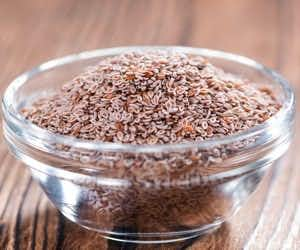
Dietary fiber is almost universally acknowledged as beneficial. Diets rich in whole grains and vegetables that supply fiber seem to be associated with better cardiovascular health, better metabolic balance and greater regularity. The laxative psyllium is based on plant fiber and has multiple health benefits. In addition to helping normalize digestive function, it can also lower cholesterol.
Does the Laxative Psyllium Interact with Medications?
Q. I recently read that taking psyllium within two hours of medications or herbs can interact and make them ineffective. It seems important for doctors who recommend psyllium to mention this.
A. The soluble fiber in psyllium husks can be useful for several purposes. Most people think of this product as a laxative, perhaps because it is the main ingredient in Metamucil. The powder comes from the seeds of the Plantago ovata plant and absorbs water from the intestinal tract. That’s why psyllium can also counteract diarrhea, leading to a more formed stool.
Outside of the digestive tract, psyllium can lower cholesterol and other blood lipids (American Journal of Clinical Nutrition, Nov. 1, 2018). In addition, psyllium helps reduce variability of blood sugar. Irritable bowel syndrome may also be less troublesome when people are taking psyllium.
You are correct that psyllium can interfere with absorption of certain medications, such as the antidepressant amitriptyline or the seizure medicine carbamazepine. Doctors should warn people to wait at least two hours after taking psyllium before taking other medicines.
You can learn more about psyllium and other natural tactics to improve regularity in our eGuide to Overcoming Digestive Disorders. For more information on natural approaches to cardiovascular risk, consider the eGuide to Cholesterol Control & Heart Health.
How Does the Laxative Psyllium Lower Cholesterol?
Q. My doctor recommended psyllium for double duty: to lower my cholesterol and keep me regular. How does this laxative lower cholesterol?
A. Psyllium is fiber from the plantago plant. It is sold as psyllium husk fiber or under a brand name such as Metamucil. Actually, psyllium can do more than double duty: in addition to serving as a laxative, the fiber can counteract diarrhea.
In addition, the soluble fiber binds to bile acids in the digestive tract, allowing you to eliminate excess cholesterol. While psyllium won’t lower total cholesterol as much as statins, it can lower this blood lipid anywhere from 9 to 15 points ( Journal of Chiropractic Medicine, Dec. 2017).
Other Benefits of Psyllium:
Overweight adults who took psyllium every day for a year as part of a randomized controlled trial had significantly lower insulin levels at the end of that time (Pal et al, Nutrients, Jan. 29, 2017). Part of the effect of psyllium both as a laxative and for lowering cholesterol and blood glucose is due to its viscosity and ability to trap liquid and form a gel (McRorie & McKeown, Journal of the Academy of Nutrition and Dietetics, Feb. 2017).
In addition, 14 randomized controlled trials showed that psyllium intake can lower systolic blood pressure (Food Science & Nutrition, Aug. 29, 2024). That drop, by about 2.5 points, was enough to be significant. A very small rise in diastolic blood pressure, approximately 0.04 points, was not. In general, it seems that taking psyllium has multiple benefits. Just let enough time go by before you take your prescription medicines.
Citations
- Jovanovski E et al, "Effect of psyllium (Plantago ovata) fiber on LDL cholesterol and alternative lipid targets, non-HDL cholesterol and apolipoprotein B: a systematic review and meta-analysis of randomized controlled trials." American Journal of Clinical Nutrition, Nov. 1, 2018. DOI: 10.1093/ajcn/nqy115
- McRae MP, "Dietary fiber is beneficial for the prevention of cardiovascular disease: An umbrella review of meta-analyses." Journal of Chiropractic Medicine, Dec. 2017.
- Gholami Z & Paknahad Z, "The effect of psyllium consumption on blood pressure: Systematic review and dose-response meta-analysis of randomized controlled trials." Food Science & Nutrition, Aug. 29, 2024. DOI: 10.1002/fsn3.3863

